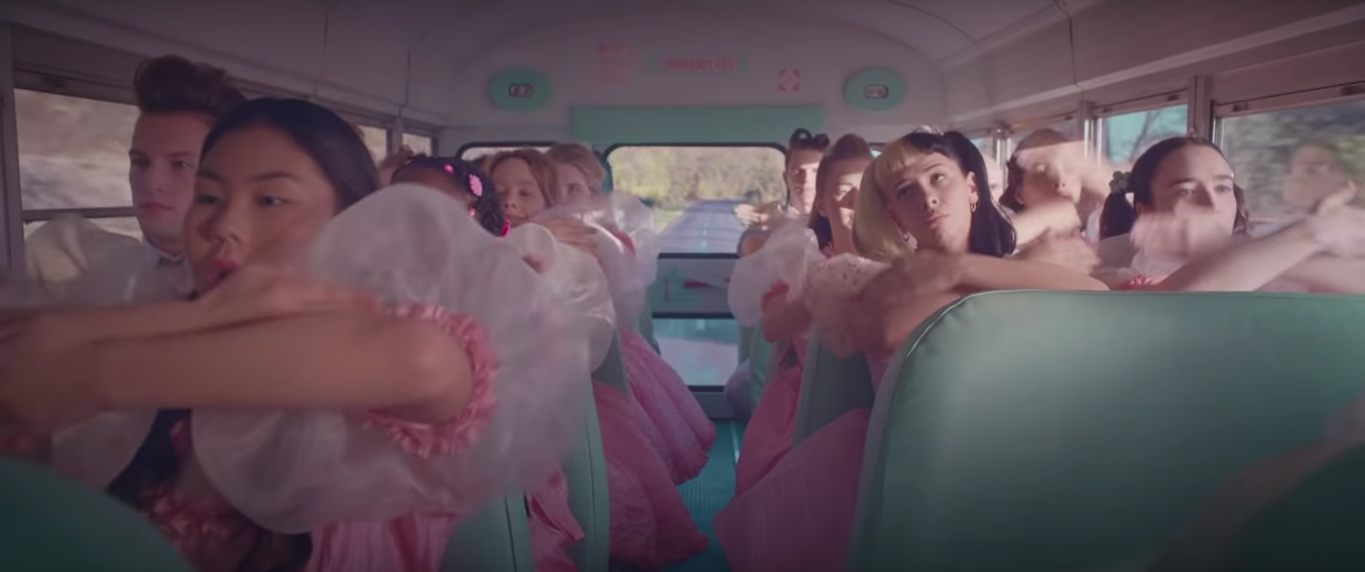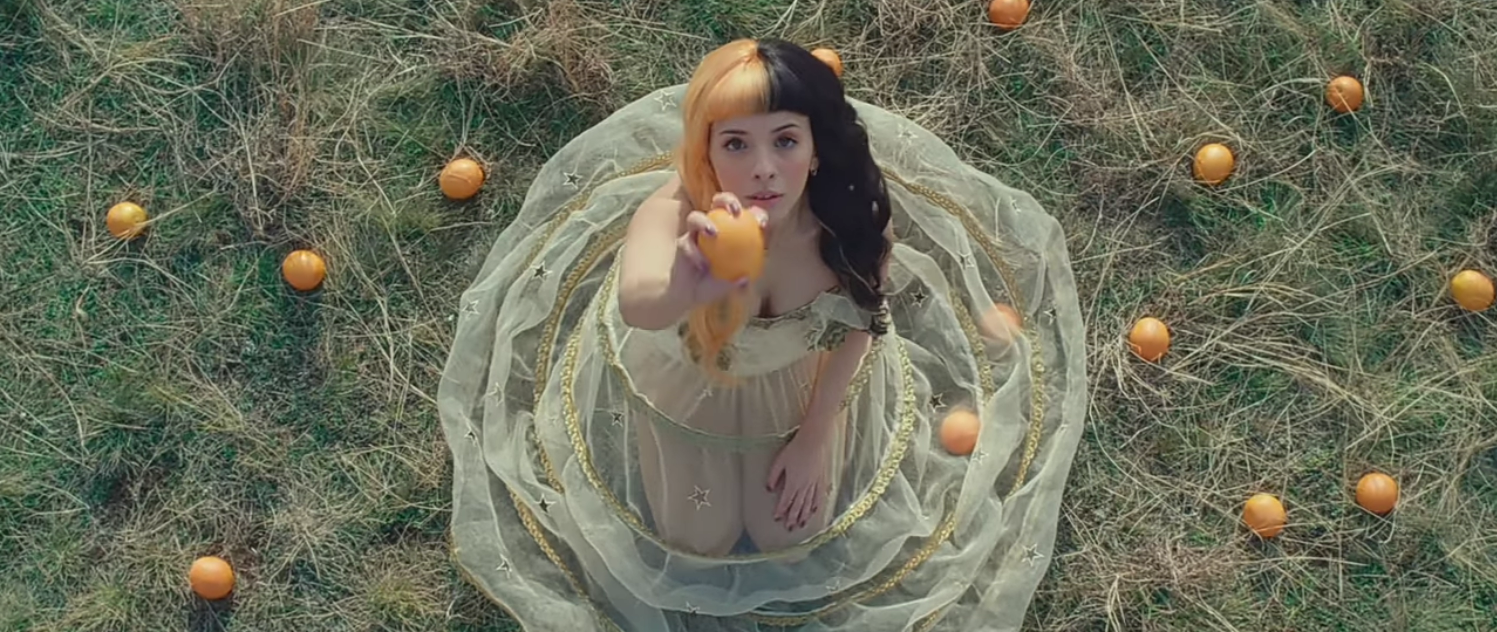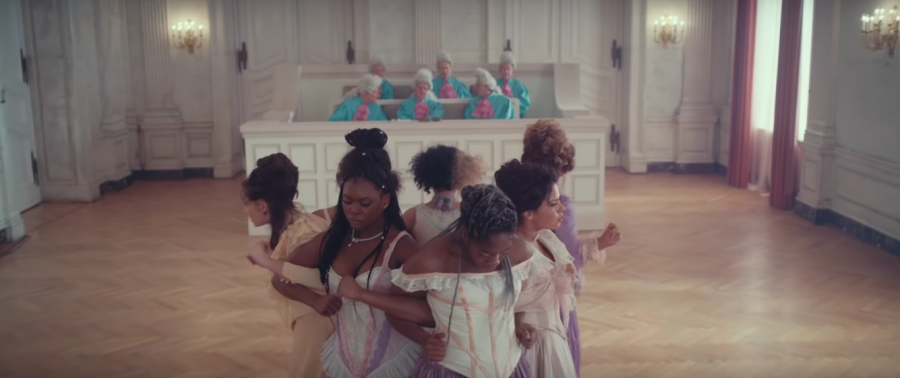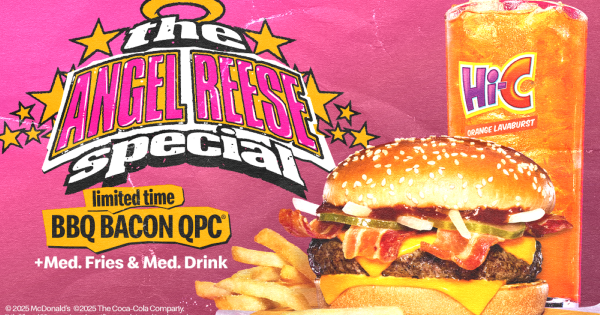Social Issues and Strawberry Shortcake: Melanie Martinez’s “K-12”
Melanie Martinez as her character Crybaby in the center, surrounded by background dancers during the choreography for “The Principal”.
![]() Melanie Martinez released her second album “K-12” on September 6, several years after her debut album, “Cry Baby”, which came out in August of 2015. During this break, she remained relatively silent with musical releases although she did release a song titled “PIGGYBACK” in December of 2017. She also did not release any singles off of the album prior to its release; however, it still claimed success, as it was a top 10 album, and it debuted at No. 3 on the Billboard 200 chart.
Melanie Martinez released her second album “K-12” on September 6, several years after her debut album, “Cry Baby”, which came out in August of 2015. During this break, she remained relatively silent with musical releases although she did release a song titled “PIGGYBACK” in December of 2017. She also did not release any singles off of the album prior to its release; however, it still claimed success, as it was a top 10 album, and it debuted at No. 3 on the Billboard 200 chart.
The album, which can be interpreted as a stand-alone, is far better understood when paired with “K-12”, a film of the same name, which stars Martinez and includes the tracklist, in its listed order.
The “K-12” album’s use as a soundtrack – while clearly a musical decision – also is present in the music itself, as many of the tracks feature non-musical sound effects – beeps and the noise of a car starting in “Wheels on the Bus,” a chalk writing on a chalkboard effect in “High School Sweethearts,” coughing, sniffling, and the ripping off of band-aids in “Nurse’s Office” – all of which suggest the album was created for the film.

However, in viewing the movie, it feels like the opposite situation: the album features quite presently, with elements of the film coming across like music videos. For example, “Wheels on the Bus,” the first track on the album, is interwoven into the first ten minutes of the film during which Crybaby, the main character, is on the bus. The scene flickers back and forth between lyrically defined plot and clips of choreographed, music video reminiscent seated dance scenes that exist merely to highlight the music. Another point at which this effect becomes awkward is during the song “The Principal” in which a dance scene is performed in front of a jury, seemingly not to progress the storyline, but which does add visual effect, and again in “Nurse’s Office” where the nurses perform a choreographed dance where the main characters aren’t even included. “Strawberry Shortcake” has minutes of irrelevant synchronized swimming, and “High School Sweethearts” would have been better off made as a music video entirely.
Returning to the album itself, “Wheels on the Bus,” the first track, has a distinct rhythm that is highlighted by its background usage of nursery and childish sounding notes that define Martinez’s art pop music style. This song puts the rest of the album on track as its lyrics contain a consistent timeline – written in a storyline format, just like her last album – and eliminating the chorus, is non-repetitive in its lyrical content. It holds a light-hearted beat that is contrary to Martinez’s darker content; a person, without understanding the lyrics, would interpret this sound as much more positive than its storyline suggests.
The second song on this 13-track album is “Class Fight,” which has a similar vibe to her previous album, one that is rather negative and ominous and hints toward the incredibly pessimistic view she presents in these albums: “K-12” touches on family problems and struggles with authority, which her previous album “Cry Baby” also deeply focused on, as well as damaged familial relationships and struggles with relationships, although “K-12” also presents an “us” versus “them” view, as Crybaby is always in a struggle against her classmates, who she says are being brainwashed.
The visual effects that accompany the music in the film are stunning, and the performance of “The Principal” is very visually pleasing and aesthetic, even despite its lack of content, as is much of the film. The interpretive dance of this scene is amazing and clearly has social meanings.
The film also carried a lot of underlying social meanings: the boys and girls are all dressed in childish styles of pink and blue, and a character named Henry was removed from class for refusing to stand for the Pledge of Allegiance. The principal fires a teacher, Ms. Harper, for declaring her intent to transition from a male, and the main characters have non-sexualized, normalizing discussions of female biology. Crybaby challenges sexism at multiple points; prior to “Drama Club” she asks for a less domestic role in a play, before being told by a male classmate: “President? What a joke. Your kind are too soft and too sensitive to handle a man’s job.”
Both the music and film also touch on other sensitive topics, such as bulimia, which “Orange Juice” was about. Martinez’s lyrics read: “You turn oranges to orange juice / Enter there then spit it out of you / Your body is perfectly imperfect / Everyone wants what the other one’s working.” In the film, Crybaby tells Fleur, the girl suffering from bulimia: “Wanna know something I learned about bodies? They don’t define us. We aren’t our bodies. They’re just temporary.”

They also exaggerate social problems to make them as clear as possible, clearly with the intent to tell a message, although after “Orange Juice” the plot fades away to what seems to be loosely intertwined music videos. “Detention” served no purpose in the plot, as vague as the plot is – even Crybaby herself couldn’t remember it – and“Teacher’s Pet” had disturbing lyrics and felt like it appeared out of nowhere. “High School Sweethearts” stood out only for the fact that it didn’t fit at all along with the film, and “Recess” felt like it was unnecessary to include, although it was very pretty. There is also the usual creep factor that is incorporated in Martinez’s work – particularly shown here through the rabbit bodyguards and the unnervingly identical nurses, which were casually accepted by the characters without any questioning – woven throughout the entire film, and album.
Overall, the album itself sounds wonderful. The film adds to the music to some degree; it definitely makes “Wheels on the Bus” less serious than it sounds, but it escalates “Strawberry Shortcake” and “Teacher’s Pet,” which was already creepy enough, but in some situations it takes the music to a different place than just listening to it would have. I didn’t like the way that “Strawberry Shortcake” was staged, and I think that its message that blaming girls for the male attraction that they get was better stated in the lyrics than it was done in the movie. The song talks about the impact of that male view on Crybaby’s perception of herself and her development, which comes across more genuinely through her lyrics: “Feeling unsure of my naked body / Stand back watch it taking shape / Wondering why I don’t look like Barbie” than through the confident scene in the movie.
The film does a lot of things wrong that the album did right, but it also explains vacuities in the musical plot. Nevertheless, the album, in general, is much better than the movie being that it does what it’s presented to be and more: it is an album with meaning beyond the standard love narrative, and it has a variety of catchy songs with melodies that vary far from the pop on the radio, laced with meaning rather than chatting about relationships as knick-knacks, and with a school theme that is particularly relatable to students.
Sydney Haulenbeek is a senior and a fourth-year writer for The Treaty. When she's at school, photography, yearbook, Montage, and senior class consume her...












